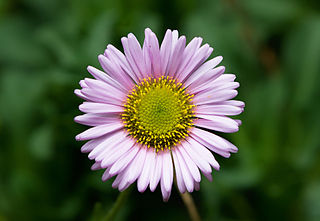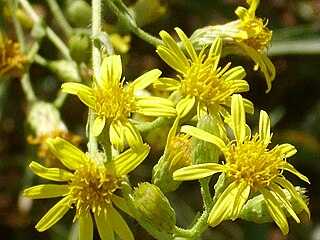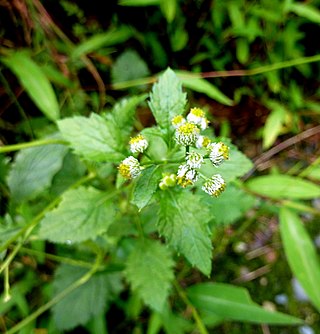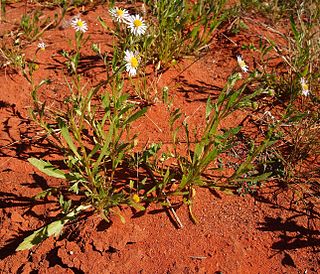
Bellis is a genus of flowering plants in the family Asteraceae.

Helminthotheca is a genus in the tribe Cichorieae of the family Asteraceae. Helminthotheca is closely related to the genus Picris, both within the Hypochaeridinae subtribe.

Argyranthemum is a genus of flowering plants belonging to the family Asteraceae. Members of this genus are sometimes also placed in the genus Chrysanthemum.

Schizogyne is a plant genus in the tribe Inuleae within the family Asteraceae. It was established in 1828 by French botanist Alexandre de Cassini.

Podolepis is a genus of flowering plants in the tribe Gnaphalieae within the family Asteraceae. It is endemic to Australia and can be found in every state.

Astereae is a tribe of plants in the family Asteraceae that includes annuals, biennials, perennials, subshrubs, shrubs, and trees. They are found primarily in temperate regions of the world. Plants within the tribe are present nearly worldwide divided into over 250 genera and more than 3,100 species, making it the second-largest tribe in the family behind Senecioneae.

The Cardueae are a tribe of flowering plants in the daisy family (Asteraceae) and the subfamily Carduoideae. Most of them are commonly known as thistles; four of the best known genera are Carduus, Cynara, Cirsium, and Onopordum.

Asteriscus is a genus of flowering plants in the family Asteraceae.

Brachylaena is a genus of flowering plants in the aster, or composite, family, Asteraceae or Compositae. Several are endemic to Madagascar, and the others are distributed in mainland Africa, especially the southern regions.

Eriocephalus is a genus of African flowering plants in the daisy family.

Mutisia is a genus of flowering plant in the tribe Mutisieae within the family Asteraceae. Mutisia has been named after José Celestino Mutis. It comprises about sixty species which can be found along the entire length of the Andes and in southern Brazil, Paraguay, Uruguay and northern Argentina.

Perityle is a genus of flowering plants in the daisy family. They are known generally as rock daisies.

Pallenis maritima, also known as the Mediterranean Beach Daisy or Gold Coin, is a perennial herb in the Asteraceae family, native to regions like the Canary Islands, southern Portugal, and parts of the Mediterranean. This plant is known for its vibrant yellow daisy-like flowers that have darker centers. Typically growing to a height of about 30 cm, it thrives in coastal and dry environments, often found in sandy soils. It requires moderate care, especially in terms of watering, where it should be watered enough to moisten the soil but not excessively to avoid root rot. In its natural environment, it can survive on rainwater but benefits from supplemental watering during dry spells. The plant prefers full sun but needs protection from intense midday heat to avoid sunburn. When grown indoors, it should be shielded from harsh air conditioning which can dry it out.

Senecio tamoides, also known as Canary creeper, is a climbing member of the genus Senecio of the family Asteraceae that is native to Southern Africa. It is used as an ornamental plant for its showy yellow, daisy-like flowers in late autumn through to winter. Other names for the plant include golden shower vine, false grapevine, and parlor ivy.

Argyranthemum frutescens, known as Paris daisy, marguerite or marguerite daisy, is a perennial plant known for its flowers. It is native to the Canary Islands. Hybrids derived from this species are widely cultivated as ornamental plants in private gardens and public parks in many countries, and have naturalized in Italy and southern California. There are many cultivars, but the most common has white petals.

Inuleae is a tribe of flowering plants in the subfamily Asteroideae.

Dichrocephala is a genus of flowering plants in the family Asteraceae, native to tropical Africa and southern Asia.

Vittadinia is a genus of Australian and New Zealand plants in the tribe Astereae within the family Asteraceae.

Glossocardia is a genus of flowering plants in the daisy family. It is native to Asia and Australia.

Urospermum, or prickly goldenfleece, is a small genus of flowering plants in the dandelion tribe within the daisy family.



















